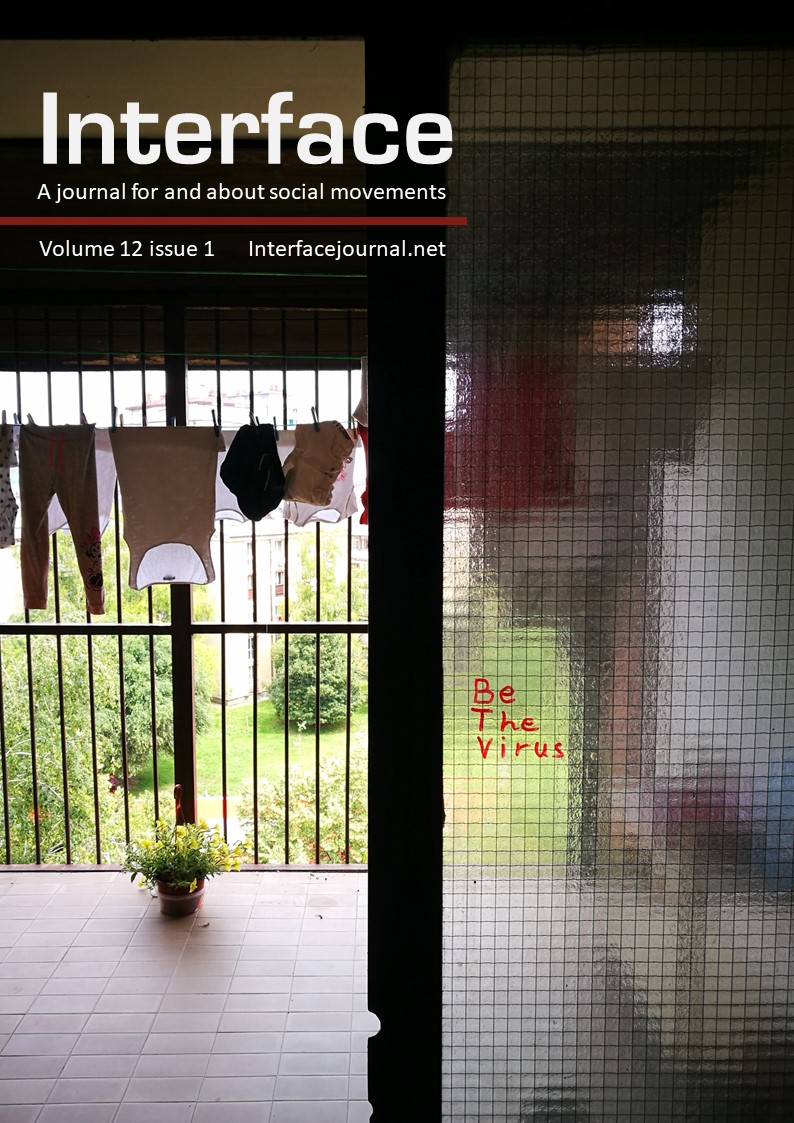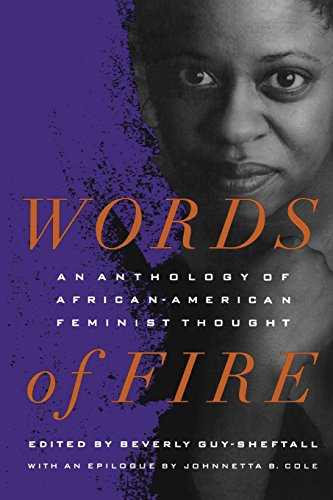Interface, 12(1): Organizing amidst COVID-19: Sharing Stories of Struggle (2020)
Filed under journal | Tags: · activism, art, contagion, ecology, feminism, food, internationalism, labour, lgbtq, migration, pandemic, quarantine, refugees, resistance, social movements, solidarity, virus

“The world is on fire, with both fever and flame. After a few months of lockdown, things are erupting in new ways. The movement for Black Lives is demanding an end to anti-Black racism and conversations about abolishing the police are on late night television. In North America, a new world appears to be dawning, one that didn’t seem possible even a month ago. Meanwhile, in the new centre of global capitalism, the long-standing Hong Kong movement seems to be on the point of succumbing to a new wave of repression.
Around the world, movements are strategizing about how to ensure that no one is left behind. In April we put out a call for short pieces on this theme. We could see that the imminent arrival of the virus had generated many different struggles – initially pressure to force some states to take action in the first place, resistance to cuts and demanding benefits. Then came struggles characterized by mutual aid, efforts to protect essential workers, and the most vulnerable, such as the homeless, prisoners, the elderly and the undocumented.
This issue contains pieces originally written for our rolling coverage of movements in the virus, as well as a few pieces written especially for this special issue. They represent reflective activists and engaged researchers trying to grasp what their movements were doing, and what they should do, in an unprecedented situation.
The contributions reflect on movements in Argentina, Australia, Austria, Belize, Bosnia and Herzegovina, Brazil, Canada, China, Denmark, Egypt, France, Germany, Greece, Haiti, India, Iran, Ireland, Italy, Japan, Kenya, Mexico, Morocco, Pakistan, Russia, Serbia, Singapore, Spain, Switzerland, Syria, Turkey, the UK, the US and globally and are written in English, French, Portuguese and Spanish.” (from Editorial)
Edited by Sutapa Chattopadhyay, Lesley Wood, and Laurence Cox
Publisher Interface, July 2020
ISSN 2009-2431
683 pages
John Akomfrah & Black Audio Fillm Collective: Handsworth Songs (1986)
Filed under video | Tags: · black people, essay film, protest, race, resistance
“Handsworth Songs was released in 1986 as a cultural response to social unrest in Birmingham and London in October 1985, looking at the way events unfolded, the two deaths (that of black woman Cynthia Jarrett and white policeman Keith Blakelock), and the subsequent media reaction.
Subsequently selected by Okwui Enwezor for inclusion in the 2002 Documenta XI in Kassel and acquired by Tate, this early work by the Black Audio Film Collective has become not only an influential touchstone for an entire genre of essayistic filmmaking, but an important document on the state of race relations in Britain since the landing of the Empire Windrush in 1948.”
“Through an impressionistic mélange of newsreel footage, photographs, and interviews, Handsworth Songs arrives at a powerful, allusive, and deeply personal statement about the black British experience.” (Ashley Clark)
Directed by John Akomfrah/Black Audio Film Collective, 1986
Produced by Lina Gopal
Commissioned by Channel 4 for their series Britain: The Lie of the Land
61 min
Interview with Collective: Paul Gilroy and Jim Pines (Framework, 1988).
Online discussion (18 June 2020)
Commentary: Salman Rushdie, Stuart Hall, Darcus Howe (The Guardian, 1987), Isaac Julien and Kobena Mercer (Screen, 1988), Stuart Hall (ICA Documents, 1989, PDF), Kobena Mercer (The Independent, 1989), Mark Fisher (Sight & Sound, 2011), Dara Waldron (Open Library of Humanities, 2017), Ann Ogidi (BFI, n.d.).
Review: John Sutherland (American Historical Review, 1989).
WEBM (427 MB)
Transcript, PDF (added on 2023-7-3)
Beverly Guy-Sheftall (ed.): Words of Fire: An Anthology of African-American Feminist Thought (1995)
Filed under book | Tags: · black people, body, civil society, class, feminism, gender, politics, race, reproduction, resistance, sex, sexuality, violence, women

“This anthology traces the development, from the early 1800s to the present, of black feminist thought in the United States, Words of Fire is Beverly Guy-Sheftall’s comprehensive collection of writings, in the feminist tradition, of more than sixty African American women. From the pioneering work of abolitionist Maria Miller Stewart and anti-lynching crusader Ida Wells-Barnett to the writings of contemporary feminist critics Michele Wallace and bell hooks, black women have been writing about the multiple jeopardies—racism, sexism, and classism—that have made it imperative for them to forge a brand of feminism uniquely their own.”
With an epilogue by Johnnetta B. Cole
Publisher The New Press, New York, 1995
ISBN 1565842561, 9781565842564
xxvi+577 pages
Reviews: Yvonne Chireau (Georgia Historical Quarterly, 1996), Kamili Anderson (Diverse, 2007).
PDF (6 MB)
See also This Bridge Called My Back: Writings by Radical Women of Color (1981) and Home Girls: A Black Feminist Anthology (1983).
Comment (0)
